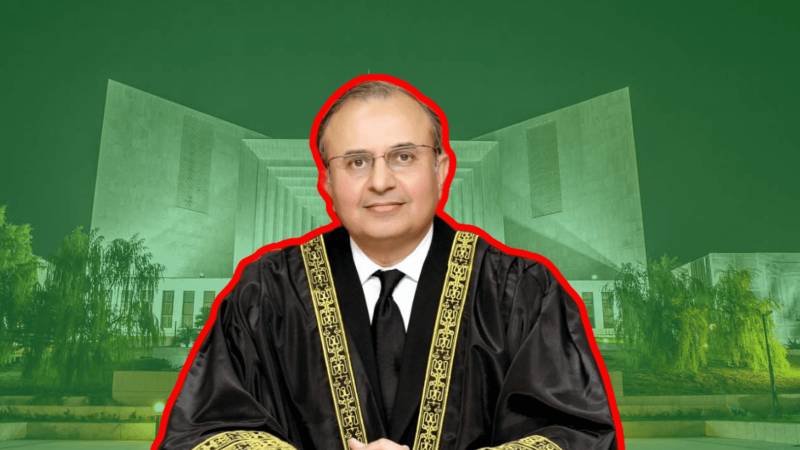
A day after openly recommending the formation of a full court bench to hear the National Accountability Bureau (NAB) Amendment case, Justice Mansoor Ali Shah on Saturday issued a note observed that cases filed under Article 184(3) of the Constitution should not be heard until the Supreme Court Practice and Procedure Act 2023, is decided to avoid anomalies.
In a two-page note authored by Justice Mansoor Ali Shah issued on Saturday, he observed that until the Practice and Procedure Act 2023 is decided, a full court bench should only be formed to hear cases filed under Article 184(3) if there is some urgency in the matter.
"The Act being a procedural law also applies to pending cases under Article 184(3) of the Constitution, including the present one (NAB amendments Case)," observed Justice Shah.
Justice Shah observed that he is aware that an eight-member bench of the Supreme Court had suspended the act. But, he added, the stay remains an interim measure.
"If ultimately the court upholds the constitutional validity of the act, which is an equally possible outcome with that of the possible decision of its constitutional invalidity, the act would take effect from the date of its enforcement, not from the date of decision of the court," Justice Shah observed.
This is not the first time that Justice Mansoor has expressed his reservations regarding the formation of benches. Justice Shah had maintained a similar opinion during hearings on a case against the trial of civilians in military courts.
NAB Amendments have been under scrutiny since July 19, 2022, on a petition filed by Pakistan Tehreek-e-Insaf Chairman Imran Khan.
After the 46 hearings in that case, the Parliament enacted the Supreme Court (Practice and Procedure) Act 2023 on April 21, 2023.
Section 3 of the act requires that benches formed for hearing petitions filed under Article 184(3) of the Constitution will be constituted by a committee comprising the Chief Justice of Pakistan and two senior-most judges of the court.
Section 4 provides that any case involving the interpretation of the constitutional provision is to be heard by a Bench comprising at least five judges.
Longstanding split
After the parliament had passed the law, the next hearing of the NAB amendments case caup up on May 16, 2023. But before the hearing, Justice Mansoor noted that he had expressed reservations about the formation of the bench to the chief justice.
"Before the said hearing, I apprised the Honourable Chief Justice of Pakistan of my reservations to continue with hearing the case by the present bench," Justice Shah stated in his note.
As a result, the case was adjourned on that date.
"My understanding was that the present case would be taken up for further hearing only after the constitutionality of the Act is finally decided by this court," Justice Shah observed.
He further expressed reservations that the NAB amendments case was fixed for another hearing on August 18, while no date was set for the hearing of the case against the Practice and Procedure Act to determine its constitutionality.
"In case the Act is held to be valid, the decision of this bench, which is not constituted as per the procedure prescribed and strength of Judges required under the Act, in the present matter, may arguably be coram non judice and thus a nullity in the eye of law."
"To avoid such an anomaly, I was of the view that the cases under Article 184(3) of the Constitution should not be heard till the case dealing with the constitutional validity of the Act is decided, or if some urgency requires that a case under Article 184(3) of the Constitution must be heard, it would be prudent and appropriate if it is heard by a Full Court Bench," said Justice Shah suggested.
Justice Shah hoped that Chief Justice Umar Ata Bandial would consider his request to constitute a full court bench.
Assistance sought
Justice Shah asked the parties in the NAB amendment case to assist the court on whether the bench should continue hearing the case or adjourn it until a decision is made on the Supreme Court Practice and Procedure Act.
He further directed the lawyers for both sides to provide the court assistance on whether the full court should hear the case if the constitutionality of the Act remains undecided.
Justice Shah has continuously asked the lawyers in the case to establish how the NAB Amendments violate the petitioner's fundamental rights.
Legal experts believe that Justice Shah has put the ball in the court of the counsels representing parties in the matter by posing legal questions.
They say that Justice Shah directed the counsel to respond to questions at a time when Chief Justice Umar Ata Bandial expressed the desire to decide the case before he retires.
They say that the matter has been adjudicated and discussed in 46 hearings, so it is unlikely that the chief justice will form a full court bench at this late stage.
However, they add, the decision on a review petition in the NAB Amendments case would be important as Chief Justice-designate Qazi Faez Isa would be the master of the roster by that time.

